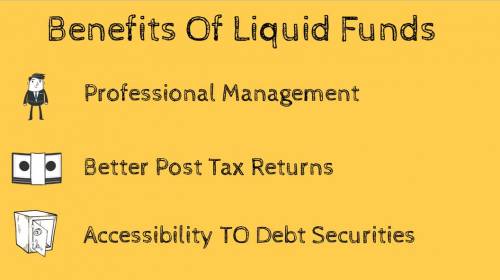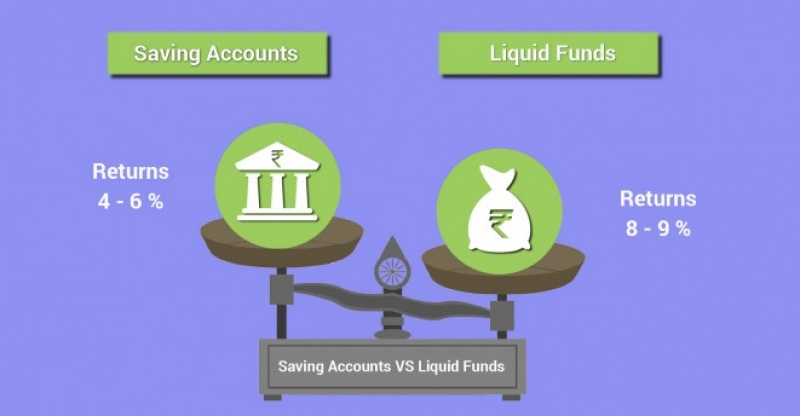Debt funds: Know when you should invest in liquid funds
Liquid funds are investment schemes that can offer adequate returns with low risk and can help you achieve your financial goals smoothly by providing unexpected
- by B2B Desk 2020-12-31 05:28:39
Liquidity in an individual's portfolio is an investment standard that has been greatly underestimated by the joint investor. If your investment portfolio does not have sufficient liquidity to handle contingencies, ongoing expenses, and planned contingencies, your financial plans can deviate and end up with unexpected losses.
Liquid funds are investment schemes that can offer adequate returns with low risk and can help you achieve your financial goals smoothly by providing unexpected possibilities.

What are liquid funds?
Liquid funds are at the lowest end of the investment risk-return spectrum. That is, they achieve one of the lowest returns compared to debt or equity funds, but at the same time the risk of capital loss is much lower. For investors, it is equivalent to a savings account in a savings bank. These funds invest in short-term securities with a maturity of up to 91 days. Securities can be debt instruments or the money market. Since the expiration period is very short, there are negligible fluctuations or risks. The return data for these funds is also available for periods of seven days, 15 days, and one month. The net asset value will be available, up to four decimal places, for the investor to assess true returns and volatility, or fluctuations in performance.
How to invest in liquid funds
Investors should consider the timelines for investing in liquid funds. For purchase and transfer transactions, the last stop is 1:30 PM. For orders received before this deadline on any day, the closing of the NAV of the immediately previous day will apply. If receipt takes place after the cut-off date, the previous day's net asset value is applied directly to the next business day.
For refunds and cancellations, the cut-off time is 3:00 p.m. If the request is received before this deadline, the NAV close of the day immediately before the next business day applies. If received after the cut-off date, the closing NAV will apply to the next business day.
To invest in liquid funds, investors need to consider some criteria. One of them is the so-called modified term. Measures the fund's sensitivity to interest rates. The adjusted duration of liquid funds should below.
The other factor is the fund's performance against its benchmark, which could be the NSE or MIBOR CRISIL Liquid Fund Index. Finally, investors should pay attention to the fund's credit risk - if it is high, the fund may not be a good liquidity choice.

When to invest in liquid funds
Investors who routinely put their money in savings accounts because there are no short-term low-risk options should instead opt for liquid funds. This step can result in you getting 1-3% more returns compared to savings bank returns. Liquid funds can sometimes provide higher returns than term deposits or small post office savings plans, depending on prevailing interest rates.
Liquid funds are an ideal investment vehicle when you need to temporarily retain the proceeds from the sale of a stock or property, for example, before reinvesting in instruments that produce higher returns. They can also provide a safe haven when the market is in crisis and you need to protect your investment from potential losses and volatility.
You can also make cash a permanent part of your wallet to avoid unexpected emergencies. But, in this case, know that there is an opportunity cost to doing so: You lose higher-performing instruments once you've been investing in cash for more than 91 days.
Liquid funds are an underutilized but very easy option for investors to earn a few percentage points more than savings bank interest rates without any additional risk and to hold their money for shorter periods as part of their portfolio strategy.
Liquidity rules
- Liquid funds are an ideal investment vehicle when you need to temporarily withhold income from the sale of stocks or properties, for example
- It is considered a safe haven when the market is in crisis and you need to protect your investment from fluctuations and potential losses.
- Investors should be aware of the credit risk assumed by the fund; if it is high, the fund may not be a good liquidity option.
Also Read: Your Guide to Choosing Small Business Insurance-Business2Business
POPULAR POSTS
Best Silver Investment Platforms for 2025: From CFDs to Digital Vaults Explained
by Shan, 2025-10-23 12:22:46
Best Investment Plans in India for 2025: A Complete Guide to Grow and Protect Your Wealth
by Shan, 2025-09-18 10:20:46
Which venture capital firms are the most active in funding Indian startups in 2025
by Shan, 2025-08-06 10:42:11
Top 5 Apps to Buy Digital Gold in India (2025): Safe, Simple & Secure
by Shan, 2025-08-01 10:24:51
10 Highest Dividend Yield Stocks in August 2025
by Shan, 2025-07-28 09:31:02
Exchange-Traded Fund (ETF): A Practical Guide to Smart Investing
by Anmol Chitransh, 2025-04-17 10:18:20
The Ultimate Guide to Commodity Trading: Strategies, Risks, and Opportunities
by Anmol Chitransh, 2025-04-02 07:06:01
RECENTLY PUBLISHED

Loan EMIs to Drop as RBI Slashes Repo Rate - Full MPC December 2025 Highlights
- by Shan, 2025-12-05 11:49:44

The Agentic Revolution: Why Salesforce Is Betting Its Future on AI Agents
- by Shan, 2025-11-05 10:29:23

Pine Labs IPO 2025: Listing Date, Grey Market Premium, and Expert Outlook
- by Shan, 2025-11-05 09:57:07

Top 10 Insurance Companies in India 2026: Life, Health, and General Insurance Leaders Explained
- by Shan, 2025-10-30 10:06:42

OpenAI Offers ChatGPT Go Free in India: What’s Behind This Big AI Giveaway?
- by Shan, 2025-10-28 12:19:11





 Subscribe now
Subscribe now 